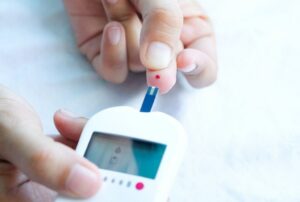Prediabetes is a wake-up call, a signal that your blood sugar levels are higher than normal, yet not high enough to be classified as type 2 diabetes. This condition serves as an alert, indicating that it’s time to make lifestyle changes to prevent the progression of diabetes. In this blog, we aim to empower you with knowledge and prediabetes treatment strategies to effectively manage the condition.
Contents
Is Prediabetes 100% Reversible?
 Prediabetes is a health condition characterized by blood sugar levels that are higher than normal but not yet high enough to be classified as type 2 diabetes. This presents a critical window of opportunity for individuals to make lifestyle changes and potentially reverse its progression. This stage is often regarded as a warning sign, signaling the need for immediate attention to one’s health habits. The question of whether prediabetes is 100% reversible is complex and varies from person to person. However, numerous studies have shown that significant lifestyle modifications can markedly reduce the risk of progressing to type 2 diabetes.
Prediabetes is a health condition characterized by blood sugar levels that are higher than normal but not yet high enough to be classified as type 2 diabetes. This presents a critical window of opportunity for individuals to make lifestyle changes and potentially reverse its progression. This stage is often regarded as a warning sign, signaling the need for immediate attention to one’s health habits. The question of whether prediabetes is 100% reversible is complex and varies from person to person. However, numerous studies have shown that significant lifestyle modifications can markedly reduce the risk of progressing to type 2 diabetes.
The potential for reversing prediabetes hinges on several factors, including an individual’s genetic predisposition, the duration of elevated blood sugar levels, and the presence of other health conditions. However, it’s important to note that while these changes can return blood sugar levels to a normal range, the risk of developing diabetes may still linger. Especially if these healthy habits are not consistently maintained. Therefore, the concept of “reversal” should be viewed more as ongoing management and prevention, rather than a permanent cure.
What Are Some Best Prediabetes Treatment Options?
Prediabetes is a condition that serves as a precursor to type 2 diabetes, characterized by slightly elevated blood sugar levels that are not high enough to be classified as diabetes. Managing prediabetes is crucial to prevent its progression to type 2 diabetes. Here are some of the most effective prediabetes treatment options:
Dietary Changes
One of the most effective ways to manage prediabetes is through dietary adjustments. This involves consuming a balanced diet rich in fruits, vegetables, whole grains, and lean proteins while reducing the intake of processed foods, sugars, and unhealthy fats. It’s not just about what is eaten, but also how much and how often. Portion control plays a crucial role in managing blood sugar levels. Incorporating fiber-rich foods can also be beneficial. Because they help slow down the absorption of sugar into the bloodstream, thereby aiding in blood sugar regulation.
Increasing Physical Activity
Regular physical activity is another cornerstone in the management of prediabetes. Engaging in at least 150 minutes of moderate-intensity exercise per week, such as brisk walking, cycling, or swimming, can significantly improve insulin sensitivity. This means that the body’s cells are better able to use the available insulin to take up glucose from the bloodstream. Exercise also helps in weight management, which is crucial in prediabetes treatment. It’s important to choose activities that are enjoyable and sustainable in the long term to ensure consistency.
Weight Management
Losing weight, particularly for those who are overweight, can have a profound impact on prediabetes. Even a modest weight loss of 5-10% of body weight can improve insulin resistance, decrease blood sugar levels, and reduce the risk of developing type 2 diabetes. Weight loss can be achieved through a combination of dietary changes and increased physical activity. It is important to approach weight loss as a gradual and sustainable process, focusing on long-term lifestyle changes rather than quick fixes.
Monitoring Blood Sugar Levels
 Regular monitoring of blood sugar levels can help in managing prediabetes effectively. It allows individuals to understand how different foods and activities affect their blood sugar and helps in making informed decisions about diet and exercise. Blood sugar monitoring also provides early detection if the levels start trending towards diabetes, allowing for timely intervention. It’s recommended to work closely with a healthcare provider to determine the best monitoring plan and understand the target blood sugar levels.
Regular monitoring of blood sugar levels can help in managing prediabetes effectively. It allows individuals to understand how different foods and activities affect their blood sugar and helps in making informed decisions about diet and exercise. Blood sugar monitoring also provides early detection if the levels start trending towards diabetes, allowing for timely intervention. It’s recommended to work closely with a healthcare provider to determine the best monitoring plan and understand the target blood sugar levels.
Medication Management
While lifestyle changes are foundational in managing prediabetes, in some cases, medication may be recommended. One commonly prescribed medication is Metformin. It helps to lower blood sugar levels and improve the body’s sensitivity to insulin. This medication is particularly beneficial for individuals who have other risk factors for diabetes, such as a family history of the disease, or those who struggle to control blood sugar levels through lifestyle changes alone. However, it’s important to note that medication is typically used as an adjunct to, not a replacement for, lifestyle modifications.
Regular Health Check-ups
Regular monitoring of health is crucial for individuals with prediabetes. This includes routine blood sugar testing to keep track of glycemic control and periodic check-ups with healthcare providers. These check-ups can help in adjusting treatment plans as needed, monitoring for the development of diabetes, and managing other risk factors like high blood pressure or high cholesterol. Health professionals can also provide guidance and support for ongoing lifestyle management, addressing any challenges in maintaining dietary changes, physical activity, or weight loss goals.
Stress Management and Mental Health Support
Stress and mental health play significant roles in managing prediabetes. Chronic stress can affect blood sugar levels and make it more challenging to maintain healthy lifestyle choices. Techniques like mindfulness, meditation, and yoga can be effective in reducing stress. Additionally, counseling or therapy can help address any underlying emotional or psychological barriers to making necessary lifestyle changes. Support groups or educational programs specifically for individuals with prediabetes can also provide emotional support and further information on managing the condition effectively.
It’s important to note that these prediabetes treatment options should be personalized. These should be based on an individual’s health status, lifestyle, and risk factors. A healthcare provider can offer the best guidance on the most appropriate treatment strategy for each individual.
What Foods To Avoid If You Are Prediabetic?
 If you are prediabetic, it’s crucial to be mindful of your diet as certain foods can exacerbate high blood sugar levels. And, increase the risk of developing type 2 diabetes. Here are some key types of foods to avoid or limit:
If you are prediabetic, it’s crucial to be mindful of your diet as certain foods can exacerbate high blood sugar levels. And, increase the risk of developing type 2 diabetes. Here are some key types of foods to avoid or limit:
- Refined Carbohydrates
Foods made with refined or processed carbohydrates, such as white bread, white rice, and pastries, can lead to rapid spikes in blood sugar levels. These foods have a high glycemic index and are low in essential nutrients and fiber.
- Sugary Beverages
Drinks high in added sugars, like sodas, sweetened teas, and energy drinks, are major contributors to blood sugar spikes. They are high in calories and offer little to no nutritional value.
- Fried and High-Fat Foods
Fried foods and those high in unhealthy fats, such as trans fats and saturated fats, can contribute to weight gain and insulin resistance. Foods like fried chicken, French fries, and fatty cuts of meat should be limited.
- Processed Meats
Studies have shown a link between the consumption of processed meats (like hot dogs, bacon, and deli meats) and an increased risk of type 2 diabetes. These are often high in sodium and preservatives. These are not conducive to a prediabetes-friendly diet.
- Full-Fat Dairy Products
While dairy can be a healthy part of your diet, full-fat dairy products can be high in saturated fats. Opting for low-fat or non-fat dairy options can be a healthier choice.
- Alcohol
Excessive alcohol consumption can lead to an increase in blood sugar levels. And, can interfere with insulin effectiveness. Moderate consumption or avoiding alcohol is advisable.
- High-sugar snacks and Sweets
Snacks and sweets like cookies, cakes, and candy bars are high in sugar and can rapidly increase blood sugar levels. They are also often high in calories and low in nutrients.
In general, focusing on a balanced diet rich in whole foods, fiber, lean proteins, and healthy fats can help manage blood sugar levels effectively. It’s always recommended to consult with a healthcare provider or a dietitian for personalized dietary advice.
Are Bananas OK For Prediabetes?
Bananas, often regarded with caution by those monitoring their blood sugar levels, can be a part of a prediabetic diet when consumed mindfully. The key lies in their ripeness and serving size. Unripe or green bananas have a lower glycemic index compared to ripe ones and contain resistant starch. It has less of an immediate impact on blood sugar. This type of starch isn’t fully broken down and absorbed by the body. Hence it doesn’t cause a significant rise in blood sugar.
However, it’s important to consider the overall dietary pattern rather than focusing on a single food. Balancing a banana with sources of healthy fat, fiber, and protein can further help in moderating blood sugar spikes. For example, pairing a banana with a handful of nuts or a spoonful of nut butter can provide a more balanced snack. It’s also crucial for those with prediabetes to monitor their blood sugar response to different foods. And, consult with a healthcare provider or a dietitian to create a personalized eating plan.
Conclusion
In conclusion, prediabetes treatment effectively involves a comprehensive approach that includes making informed dietary choices, staying active, monitoring blood sugar levels, and maintaining a healthy weight. It’s important to remember that foods like bananas can be included in a balanced diet. But attention should be paid to their ripeness and portion sizes. Emphasizing a diet rich in whole foods, lean proteins, and healthy fats, while minimizing processed foods and added sugars, is key.
Remember, each small step towards a healthier lifestyle can make a big difference in managing prediabetes. Do you want to get rid of diabetes? Join our online diabetes treatment program and reverse Diabetes naturally through lifestyle changes such as a Personalized Diet plan, Exercise, Yoga, dieticians, and health coaches.

